Your Cart is Empty
Happy Thanksgiving! We will be shipping out orders on Monday November 20th ONLY. Our regular shipping schedule will resume on Monday November 27th.
Alfalfa Powder: is especially high in vitamins niacin, riboflavin, folic acid, C, D, E, K, beta carotene (Vitamin A precursor) and the minerals iron, calcium, potassium, phosphorous, magnesium. Alfalfa also contains bioflavonoids, several digestive enzymes, many sterols (fats), amino acids, and trace elements. It is highly nutritive, and functions as an internal cleanser and appetite stimulant. Alfalfa also aids a variety of health problems such as arthritis, heart disease, high blood pressure and digestive ailments.
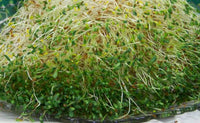
Alfalfa Sprouts: known as the "Three-Star Superfood," providing isoflavones, coumestans, and lignans. These nutrients play an important role in prevention of cancer, hormonal problems, and heart disease. Sprouts contain twice as much protein as spinach. They are a good source of enzymes, Vitamins A, C, & K, are low fat, high fiber, high energy and no cholesterol. They are good as an anti-arthritic and anti-asthmatic, and are the richest land grown source of trace minerals and elements such as potassium, magnesium, and iron.
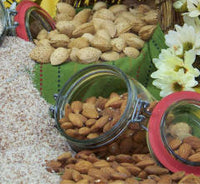
Almonds: are the leading food source of alpha-tocopherol (Vitamin E), the more powerful and absorbable form of this antioxidant vitamin. Almonds provide almost as much protein as red meat. They are cholesterol free, low in saturated fat, and high in Vitamin D, calcium, magnesium, fiber, zinc, folic acid, and potassium, all of which are beneficial to heart health. They are also rich in the antioxidants Vitamin C, selenium, and beta-carotene, to protect against cell damage.
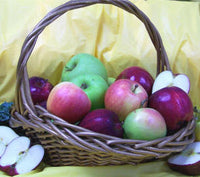
Apples: are an alkaline food rich in vitamins A, B, and C, calcium, fiber and pectin. Pectin binds glucose to help regulate insulin. Pectin also binds minerals such as iron and copper, to prevent toxic buildup in the body; purifies the blood to help health problems such as heart disease and colon ailments; and promotes good digestion and growth, as well as a healthy lymphatic system.
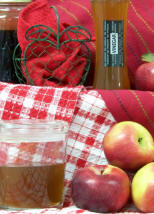
Apple Cider Vinegar (ACV) used in its raw, unfiltered state, helps to maintain proper acid/alkaline balance in the body. It contains a multitude of healthy minerals, aids calcium uptake in young animals, and helps detoxify the blood. Reportedly helps protect against: fleas, ticks, parasites, ringworm, fungus, mange, kidney and bladder stones, arthritis, sore joints and weak muscles.
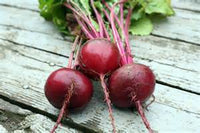
Beets are a good source of Vitamin C, Iron, Magnesium, Folate, Potassium and Manganese. They contain a unique antioxident called betalain, which helps protect against heart disease and cancer.
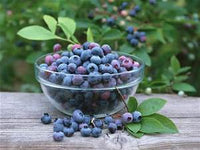
Blueberries contain phytonutrients that function both as antioxidants and anti-inflammatory compounds in the body. There is new evidence that blueberries reduce damage to muscles following heavy exercise. They also protect the nervous system from oxidative stress.
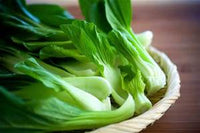
Bok Choy is a good source of vitamins and trace minerals. It also contains a wide range of phytonutrient antioxidants such as flavonoids like quercetin, kaempferol, and isorhamnetin, as well as numerous phenolic acids.
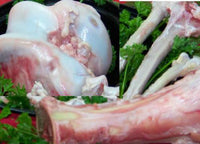
Bones Real, ground bones contain protein, essential fatty acids, fats, vitamins and minerals, especially calcium. Bones are Nature's powerhouse store of minerals: there is no more complete or balanced source for our pets. We grind the bones so you needn't worry about your pet ingesting large or sharp pieces. You should still offer your pets safe, raw bones for recreational chewing several times a week, to promote good dental health.
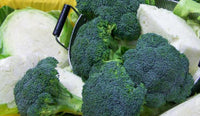
Broccoli is touted as an anti-cancer vegetable, reported to reduce the risk of lung, stomach and other cancers. Broccoli is high in vitamins A and C, and minerals Calcium and Potassium. It also contains a special substance called indole-3-carbinol, which is a glucosinolate. It is believed that this I3C may protect against breast cancer. (Some information taken from the Reader's Digest, Nov 2000.)

Cabbage is now being touted as an anti-cancer vegetable, reported to reduce the risk of lung, stomach and other cancers. Cabbage is one of the few vegetables that contains vitamin E. It is also helpful to soothe the digestive tract, and is useful against stomach ulcers.
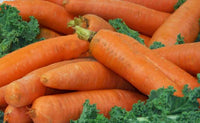
Carrots: high in beta-carotene, a precursor of Vitamin A, which aids in vision, reproduction, and a healthy immune system. Also high in vitamin C, potassium, and fiber. Helps keep tissues healthy; strengthens the immune and eliminative systems.

Celery is high in potassium, calcium, and folate. Shown to reduce blood pressure in animals. Contains anti-cancer compounds.
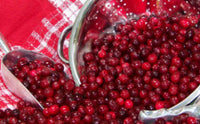
Cranberries: contain "proanthocyanidins" which have been shown to improve urinary tract health. An excellent source of the minerals magnesium, potassium, and phosphorous, plus the vitamins A, C, thiamine, riboflavin, niacin, and K. Lower the glycemic value of foods, helping to control insulin levels. The tannins in cranberries prevent bacteria from sticking to the walls of the bladder, thus preventing urinary tract infections.

Eggs are called "Nature's Perfect Food" because they provide a complete amino acid profile and other essential nutrients. Our eggs are used "whole," which includes the shell, finely ground, as an additional source of natural calcium.
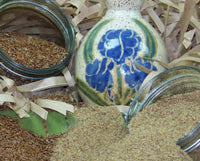
Flax Seeds provide fiber, essential fatty acids (EFA), and many other essential nutrients. EFAs contribute to keeping the cardiovascular, nervous, immune and reproductive systems functioning properly. Flax helps maintain a healthy metabolism, keep the bowel system regular and prevent constipation. Often used to treat health ailments such as cancer, heart problems, arthritis, and reproductive problems.
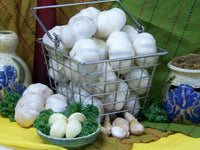
Garlic: Among its many claims to fame, garlic is said to serve as a natural antibiotic/antimicrobial, boost the immune system, lower cholesterol, prevent cancer and heart disease, and make pets less attractive to pests such as fleas and ticks. Fresh garlic is best; powdered supplements are not as effective. Contrary to some information being currently circulated, garlic is not harmful to our pets. As long as it is used in moderation, the health benefits far outweigh any remote health risks. Most animal nutritionists recommend the use of fresh, raw, minced garlic for all dogs and cats. You would need to feed many pounds of garlic every day for a long time before you would create a health hazard for your pet.
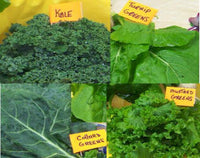
Greens (Beet Greens, Collard, Kale, Mustard, Swiss Chard, Spinach, Turnip): Dark, leafy greens contain some phytochemicals called lutein and zeaxanthin, which are thought to protect eyes as we age. (Information from Reader's Digest, Nov 2000.) They are a rich source of vitamins A, C and E, folic acid, calcium, zinc and omega 3 fatty acids. Also full of anti-oxidants and anti-cancer properties.
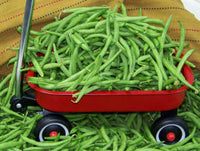
Green Beans are a good source of Vitamin C, iron, magnesium, folic acid, potassium, fiber, and zinc. They are fat free, sodium free and cholesterol free.

Honey is a combination of pollen and bee enzymes, made up of 35% protein, which contains half of all the necessary amino acids. It is a highly concentrated source of many essential nutrients, including minerals, B-complex vitamins, and vitamins C, D and E. Honey also is rich in pre-biotics, which are micro-organisms that serve as a food source for pro-biotics (beneficial bacteria that reside in the intestinal tract). In addition, hone is a natural antiseptic, and promotes healing and energy in the body.
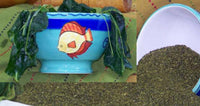
Kelp has a trace mineral content which is among the highest of any known single source, and is especially valued for its anti-cancer, anti-rheumatic, anti-inflammatory, hypotensive and fibrous qualities. The iodine content of kelp is thought to be useful in treating mild cases of hypothyroidism. Kelp improves circulatory stimulation and promotes growth of good hair coat in dogs, cats and ferrets.
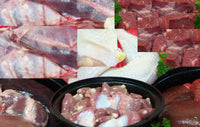
Muscle Meats contain B-complex vitamins, phosphorous, iron, sulfur, copper, and potassium. Raw muscle meats provide a "complete" and digestible protein, including all the essential amino acids. Amino acids contribute to muscle (heart, lung, other organs) tissue, and the immune, circulatory, and digestive systems.

Organ Meats (Liver, Heart, Gizzards) are rich in the following: Vitamins A, C, D, E, K, B2, B3, B5, B6, B12, biotin, folate, essential fatty acids, and the minerals zinc, manganese, selenium, and iron.
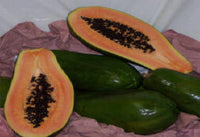
Papaya contains high amounts of Vitamins A, C, E, folic acid, and minerals potassium and iron. It also contains an enzyme called papain, which breaks down protein to make the amino acids readily available. Papaya is high in fiber, low in sodium, cholesterol and fat. Papaya seeds are edible and have anthelmintic (deworming) action to reduce internal parasites such as tapeworms.

Parsley High in Vitamins A and C, and calcium. Acts as an antibacterial, antiviral, antiseptic and antifungal agent. Great for freshening the breath!
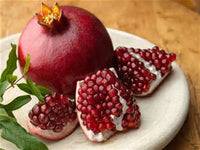
Pomegranate is especially high in Vitamins C and K, folate, potassium. The majority of the fruit is made up of its seeds, which contain abundant antioxidants that have been found to be effective against prostate cancer, diabetes, and lymphoma. Unlike some other fruits, the seeds of the pomegranate do NOT contain cyanide.
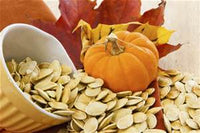
Pumpkin Seeds are a good source of several vitamins and trace minerals and are quite high in Vitamin E. For our pets, the seeds help eliminate intestinal parasites, clean blood vessels, and stimulate kidney activity. They are also helpful in treating cancer, leukemia, and sclerosis. Oil contained in the seeds helps reduce excess cholesterol. Antioxidants in the seeds help protect against heart disease.
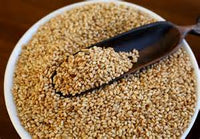
Sesame Seeds are a great source of many vitamins and trace minerals, particularly copper and manganese. They also contain two unique substances: sesamin and sesamolin. Both of these substances belong to a group of special beneficial fibers called lignans, and have been shown to have a cholesterol-lowering effect, and to prevent high blood pressure and increase vitamin E supplies. Sesamin has also been found to protect the liver from oxidative damage. Oil contained in sesame seeds is known to reduce hypertension and ease stress.
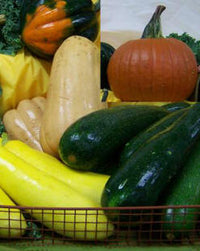
Squash (zucchini, yellow, butternut, acorn, pumpkin) is very high in Vitamin A and contains good fiber for a healthy colon. Squash seeds are anthelmintic, meaning they help eliminate internal parasites.
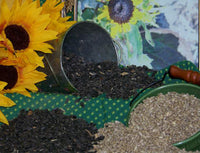
Sunflower Seeds are power-packed with healthy fats, proten, fiber, minerals, vitamin E, zinc, folic acid and phytochemicals. Considered a functional food which plays a role in memory and cognitive function. They are a good source of lignans, which lower cholesterol to protect against heart disease and some cancers. Research illustrates that coyotes include sunflower seeds as a part of their diet in the wild.

Sweet Potatoes/Yams: contain natural steroidal properties which may be useful for arthritic or joint pains. Also a great source of beta-carotene, which is the precursor to vitamin A.
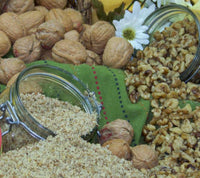
Walnuts are low in saturated fat and cholesterol to reduce the risk of heart problems. They are a good source of protein, fiber, omega 3 fatty acids, antioxidants, minerals, trace minerals and vitamins.